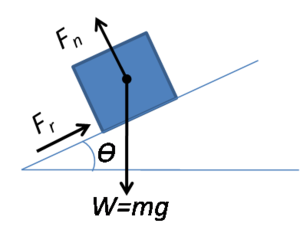Compression or Normal Force: Difference between revisions
mNo edit summary |
No edit summary |
||
| Line 1: | Line 1: | ||
Claimed by Hemanth Koralla | Claimed by Hemanth Koralla | ||
[[ | [[File:normal_force.png|right|thumb|''F<sub>N</sub>'' represents the '''normal force''']] | ||
==Compression of Normal Force== | ==Compression of Normal Force== | ||
The compression or also commonly known as the normal force, | The compression or also commonly known as the normal force, <math> F_n\ </math>, is a simple fundamental concept that must be understood before attempting any contact force problem. First, it is important to understand that the normal force is NOT a kind of fundamental force such as the electric or gravitational force. It is just a force used to describe the interaction between atoms. As hinted by the name, this force simply points in the perpendicular or "normal" direction to the surface(s) that it is in contact with. The magnitude of this normal force often just the weight of the object, depending on the angle at which object is resting on the other surfaces. | ||
Revision as of 13:19, 29 November 2015
Claimed by Hemanth Koralla

Compression of Normal Force
The compression or also commonly known as the normal force, [math]\displaystyle{ F_n\ }[/math], is a simple fundamental concept that must be understood before attempting any contact force problem. First, it is important to understand that the normal force is NOT a kind of fundamental force such as the electric or gravitational force. It is just a force used to describe the interaction between atoms. As hinted by the name, this force simply points in the perpendicular or "normal" direction to the surface(s) that it is in contact with. The magnitude of this normal force often just the weight of the object, depending on the angle at which object is resting on the other surfaces.
First Thing
A Mathematical Model
If A = B and A = C, then B = C A = B = C
A Computational Model
How do we visualize or predict using this topic. Consider embedding some vpython code here Teach hands-on with GlowScript
First Law
The first law of thermodynamics defines the internal energy (E) as equal to the difference between heat transfer (Q) into a system and work (W) done by the system. Heat removed from a system would be given a negative sign and heat applied to the system would be given a positive sign. Internal energy can be converted into other types of energy because it acts like potential energy. Heat and work, however, cannot be stored or conserved independently because they depend on the process. This allows for many different possible states of a system to exist. There can be a process known as the adiabatic process in which there is no heat transfer. This occurs when a system is full insulated from the outside environment. The implementation of this law also brings about another useful state variable, enthalpy.
A Mathematical Model
E2 - E1 = Q - W
Examples
Be sure to show all steps in your solution and include diagrams whenever possible
Simple
Middling
Difficult
Connectedness
- How is this topic connected to something that you are interested in?
- How is it connected to your major?
- Is there an interesting industrial application?
History
Put this idea in historical context. Give the reader the Who, What, When, Where, and Why.
See also
Are there related topics or categories in this wiki resource for the curious reader to explore? How does this topic fit into that context?
Further reading
Books, Articles or other print media on this topic
External links
Internet resources on this topic
References
https://www.grc.nasa.gov/www/k-12/airplane/thermo0.html http://hyperphysics.phy-astr.gsu.edu/hbase/thermo/thereq.html